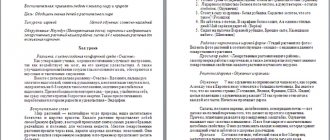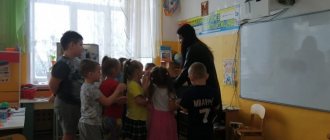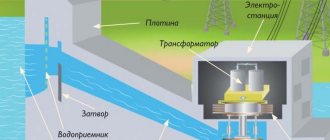A walk in the forest (outline)
PHYSICAL EDUCATION LESSON
"WALK IN THE FOREST"
AUTHOR :
Peshkov Alexey Gennadievich
PHYSICAL EDUCATION LESSON
His academic performance and desire to acquire knowledge and skills depend on how interested the student is in the lesson.
The monotony of exercises performed in a physical education lesson, especially in elementary school, leads to the child losing interest in physical education classes.
A variety of sports and outdoor games, fun starts and relay races have always been interesting for children, especially at primary school age. Therefore, in physical education lessons, I focus on the competitive-game method of conducting classes, where most of the lesson time is occupied by outdoor and sports games. Also, periodically, thematic classes are held.
Thanks to this approach, the main objectives of the lesson: developing physical qualities, improving health, etc. are solved in a more comfortable environment for the student, where there is room for excitement and self-expression.
In this case, the lesson offered is “Walk in the Forest,” based on the use of outdoor games and associative thinking.
LESSON PLAN
Physical education lesson with elementary school students
teacher: Peshkov A.G.
Subject:
"Walk in the Woods" Learning outdoor games aimed at developing speed abilities, coordination and reaction speed.
Date: 04/21/2014.
Place:
MBOU Secondary School No. 64. branch
Time spending:
12.50-13.30
Class: 2 "A"
Inventory used:
gymnastic mats 8 pcs., jump rope 1 pc., vests 20 pcs.
Lesson objectives:
Educational:
- Development of coordination abilities and orientation in space.
- Development of speed and reaction speed
- Development of endurance.
Educational:
- Nurturing strong-willed qualities and psychological stability.
- Improving group interactions.
- Development of critical thinking.
- Development of associative thinking.
Wellness:
- Strengthening joint ligaments and muscles.
- Development of the cardiovascular and respiratory systems.
- Improving posture and preventing flat feet
| Part of the lesson | № | Contents of the exercise | Dosage (number of series, execution time) | Organizational and methodological instructions |
| Preparatory | 1 | Construction, report. Setting lesson objectives. | 3 min. | Communicate the tasks, assess the students’ readiness for the lesson. Use rhymed text throughout the lesson, in accordance with the assignments. |
| 2 | Walking on your toes, in a squat, raising your knees high, on different parts of the foot, changing the position of your hands. Running at different paces, running on your toes. | 5 minutes. | Everyone leveled up at the back of their heads and stood up on their tiptoes. And along a familiar path, a crowd went into the forest. (Walking on toes) As soon as we all entered the forest, mosquitoes appeared. Hands up - hand clap. Hands down - another clap. We walk along the path again. Suddenly we meet a stream on the way. Is it really a turn? No, let's ford the river (walking with the knees raised high). We walk further through the forest. And we meet a bear. We put our hands behind our backs and waddle. (walking on the outside of the foot). While the bear was dozing, a hare galloped past (jumping forward on two legs). The hedgehog was walking through the forest and collecting leaves. (walking in a full squat) I collected a lot of leaves and ran away happy. (run) A sly fox is looking out from behind a bush ahead. We'll outwit the fox and run on tiptoes. (running on toes) | |
| 3 | Exercises to restore breathing and develop flexibility. “cat”, “snake”, “frog”, “boat”, “hunter in ambush”, “swimmer”, “fish”, etc. | 6 min. | Perform at a slow pace, using gymnastic mats. Next is a short break, it is useful for children, we will rest in a clearing and pretend to be animals. | |
| Main | 4 | Outdoor game: “Owl and Mice”*. | 7 min | Well, we rested a little, the grass was soft, and now let’s go and see how the owl hunts (game “Owl and Mice”). |
| 5 | Outdoor game: “Lions and Tigers.”** | 7 min. | There are a lot of predators in the forest and it’s not a game to joke with them, but now we guys will play “lions and tigers”. | |
| 6 | Outdoor game “Fisherman Cat”***. | 5 minutes. | We continue our walk. What awaits us next? Here we are approaching the lake, And a wild cat is fishing there (game “Fisher Cat”). | |
| Final | 7 | Sedentary game “Who’s flying?”**** | 4min. | We said goodbye to the cat, our path lies further, Let's raise our heads to the sky and see who's flying? (game "Who's Flying?"). |
| 8 | Summing up the lesson. Homework and information about the next lesson. | 3 min | The walk into the forest ended, There are a lot of good animals there And now, in honor of the end, let’s all clap our hands. |
*"Owl and mice
"- a game to develop attention, patience, peripheral vision and speed of orientation in space.
Description of the game: one of the participants is an owl, the rest are mice. The mice move randomly around the area with the command “day”. When the command “night” is given, they freeze in different positions; they cannot speak, laugh or move. Whoever breaks the rules is “carried away” by an “owl” and is eliminated from the game, and so on several times.
**"Lions and tigers"
"-the game develops reaction speed, speed, spatial orientation, and group interactions.
Description of the game: participants are divided into two teams “tigers” and “lions”. They stand opposite each other at a certain distance, and at the teacher’s signal they walk towards each other. If the teacher shouts “lions,” then the lions catch up with the tigers, who in turn run back to their home and vice versa. Whomever they manage to insult is eliminated from the game.
***“Fishing cat
“The game develops coordination, jumping ability, reaction speed, and endurance.
Description of the game: one of the participants (CAT) stands in the center of the circle with a skipping rope, the rest (FISH) in a circle. The cat spins the rope around its axis, the fish jump in place so that the rope does not catch them. Whoever gets caught is out of the game.
**** “Who’s flying?” -
The game develops attention.
Description of the game: takes place at a slow pace at the end of the lesson. The players stand opposite the leader. The presenter says (for example): “Is the sparrow flying?” or “Is the cow flying?”, if the participants agree, then they stand on their tiptoes and raise their arms up, if not, they squat. Anyone who gives the wrong answer receives penalty points.




